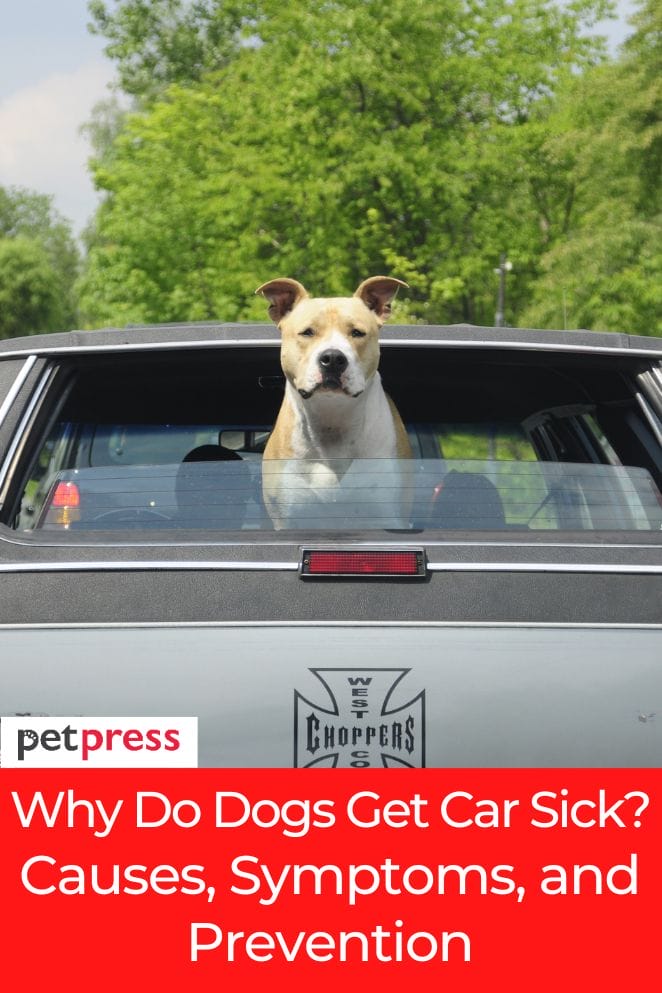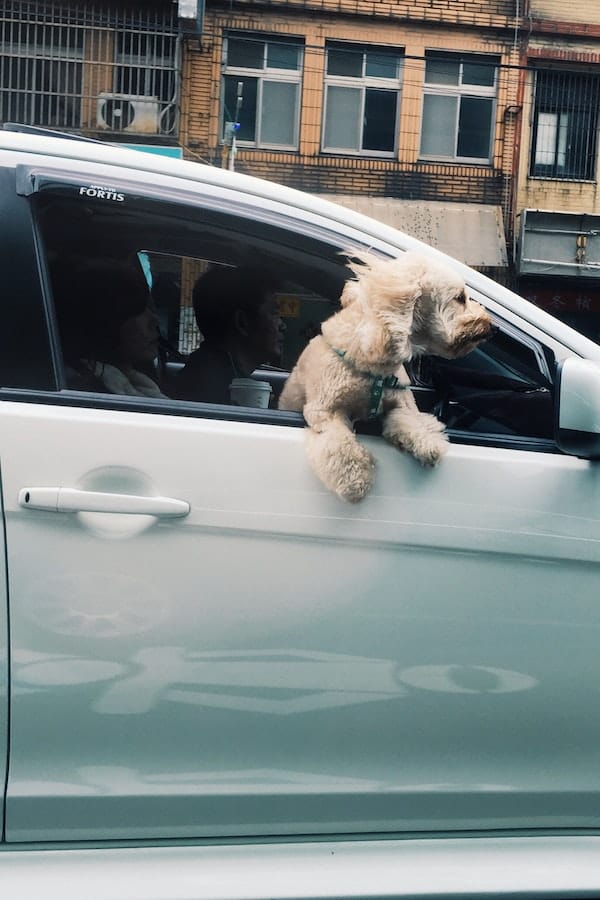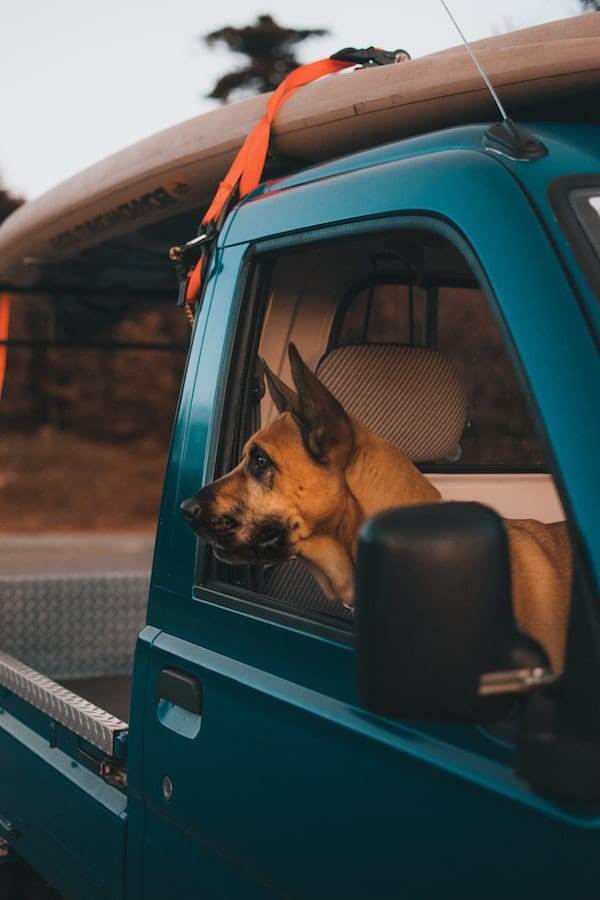
Have you ever experienced the excitement of planning a road trip with your furry companion, only to have your adventure marred by their unexpected bout of car sickness?
It’s a common issue that many dog owners encounter.
However, gaining insights into the reasons behind dogs getting car sick can empower you to take proactive steps and ensure a more enjoyable journey for both you and your beloved four-legged buddy.
In this article, we’ll explore the root causes, identifying signs, and effective preventive measures for car sickness in dogs.
Causes of Car Sickness in Dogs
The inner ear
Dogs often experience car sickness, primarily due to issues with their inner ear.
The inner ear plays a crucial role in maintaining balance, and the motion of a moving car can disrupt this equilibrium, leading to nausea and discomfort.
It’s like their own personal gyroscope that goes haywire when the car is in motion, causing their brain to receive confusing signals and triggering feelings of queasiness.
Anxiety
Just like humans, dogs can experience anxiety during car rides.
The unfamiliar surroundings, the motion of the car, and past negative experiences can make them uneasy.
Their anxiety may manifest as panting, pacing, or whining.
To help your anxious pup, start by familiarizing them with the stationary car and gradually introduce short, positive trips.
Medical conditions
Certain medical conditions like ear infections or gastrointestinal problems can make dogs more susceptible to car sickness.
These conditions can affect their balance and cause discomfort, exacerbating the car ride’s challenges.
If your dog has a pre-existing medical condition, it’s crucial to consult your veterinarian before traveling.

Signs and Symptoms of Car Sickness in Dogs
Recognizing the signs of car sickness in your dog is essential for addressing the issue promptly:
- Drooling: Excessive drooling is a common sign of distress in dogs during car rides.
- Yawning: Frequent yawning can indicate discomfort and unease.
- Restlessness: Restless behavior, like pacing or constantly changing positions, may signal car sickness.
- Panting: Rapid and heavy panting can be a response to stress and motion sickness.
- Whining: Whining is a way for dogs to express their discomfort and anxiety.
- Vomiting: The most noticeable symptom, vomiting, is a clear sign of car sickness.
- Diarrhea: In some cases, dogs may also experience diarrhea as a result of car sickness.
How to Prevent Car Sickness in Dogs
Prevention is key to ensuring your dog’s comfort during car rides:
Gradual exposure
To help your dog overcome their fear of car rides, gradual exposure is the key.
Start with short trips where your dog sits in a stationary car to get used to the environment. Make it positive and fun with treats and toys.
Then, gradually progress to short drives, rewarding them for their bravery.
Extend the duration of the rides over time, but be patient and attentive to signs of stress.
Frequent breaks
Taking regular breaks during long car journeys with your dog is essential for their comfort and well-being.
Just like humans, dogs need to stretch, walk, and relieve themselves.
Breaks allow them to reset, stretch their legs, explore their surroundings, and answer nature’s call.
Beyond physical needs, breaks also help alleviate stress and make the journey more enjoyable for your furry companion.
Well-ventilated car
Ensuring good airflow in the car is crucial to prevent car sickness in dogs.
It’s like creating a comfortable climate for your furry friend during the ride.
You can achieve this by cracking the windows slightly, using the air conditioning, or utilizing the car’s ventilation system.
Good airflow helps prevent overheating, reduces motion sickness, and makes the journey more enjoyable for your dog.
Secure restraint
Using a secure restraint or a pet carrier is a key strategy for preventing car sickness in dogs and ensuring their safety during car rides.
These measures help reduce motion and provide a secure space for your dog, allowing them to focus on the journey without feeling anxious or uncomfortable.
Options include seat belts and harnesses, pet carriers, and travel crates, with the choice depending on your dog’s size, temperament, and the nature of the trip.
Positive associations
To prevent car sickness in dogs and make car trips enjoyable, it’s all about creating positive associations.
Treats, toys, and positive experiences should be linked to car rides.
Offer treats before and during the ride, bring along their favorite toys and start with short, fun trips.
Maintain a positive attitude, praise your dog, and make car rides feel like a party on wheels.
The goal is to help your dog associate car journeys with treats, fun, and love, gradually turning the car into their happy place.

Use a calming aid
Calming aids can be a useful asset in the quest to prevent car sickness in dogs and ensure a stress-free ride for both you and your furry companion.
These aids take on various forms, such as supplements, pheromone products, anxiety wraps, and medications, each crafted with the intention of alleviating anxiety and maintaining your dog’s serenity throughout car journeys.
Restrict food intake before car rides
Utilizing a calming aid can prove incredibly beneficial when it comes to preventing car sickness in dogs and ensuring a peaceful and stress-free ride.
These calming aids come in diverse forms, such as supplements, pheromone-based products, anxiety wraps, and medications.
They are specifically crafted to alleviate anxiety and maintain your dog’s relaxation throughout car journeys.
Conclusion
It’s essential to grasp the reasons behind dogs experiencing car sickness to tackle this problem effectively and make sure your furry friend can accompany you on adventures comfortably.
By being attentive to the signs, implementing preventive strategies, and establishing positive associations with car trips, you can assist your dog in overcoming car sickness and enabling them to relish the journey as much as the final destination.
FAQs
Yes, puppies can experience car sickness just like adult dogs. They may be even more susceptible due to their underdeveloped inner ear balance.
Some medications prescribed by veterinarians can help alleviate car sickness in dogs. Consult your vet for recommendations if needed.
Motion sickness in dogs is usually not permanent and can often be managed with the right approach and care.
While any dog can get car sick, some individual dogs and certain breeds may be more prone to motion sickness than others. However, it varies from dog to dog.


GIPHY App Key not set. Please check settings